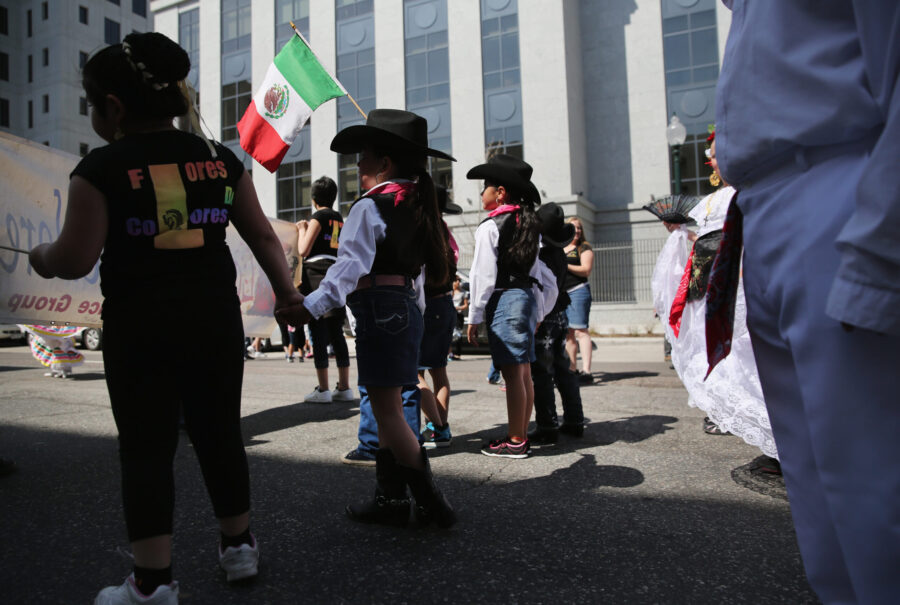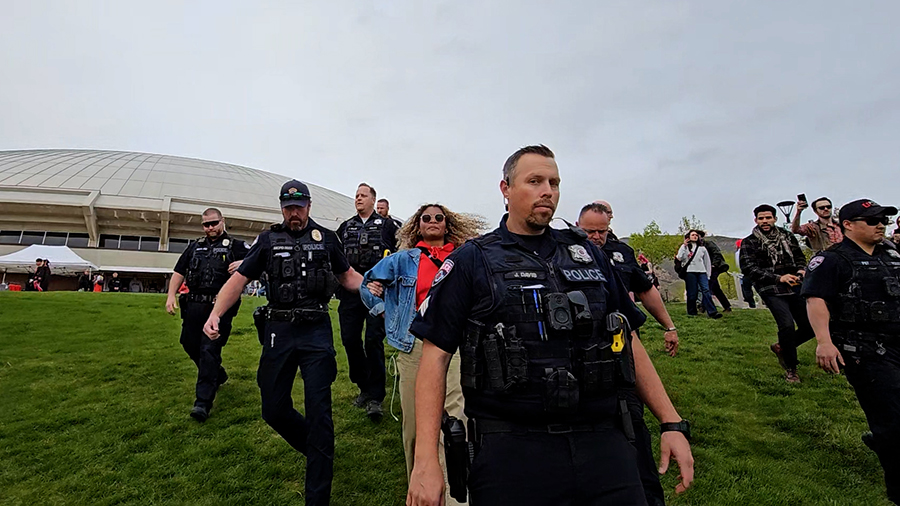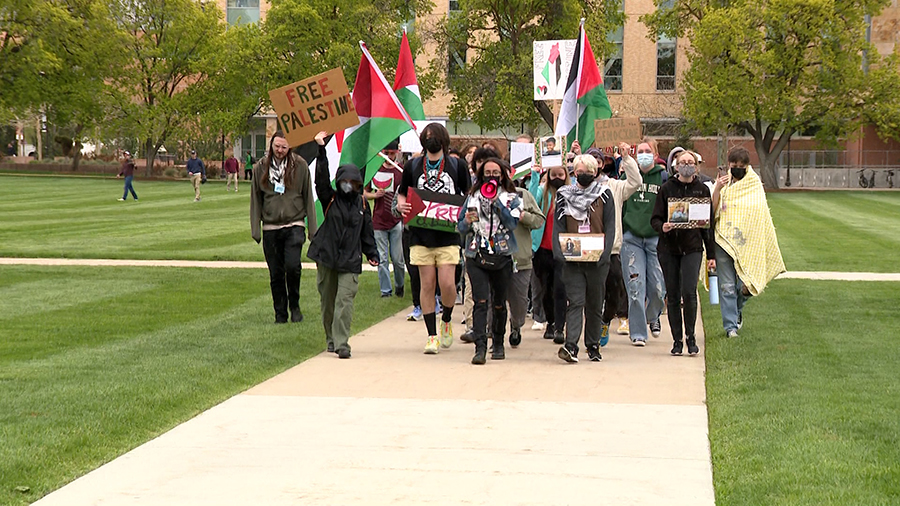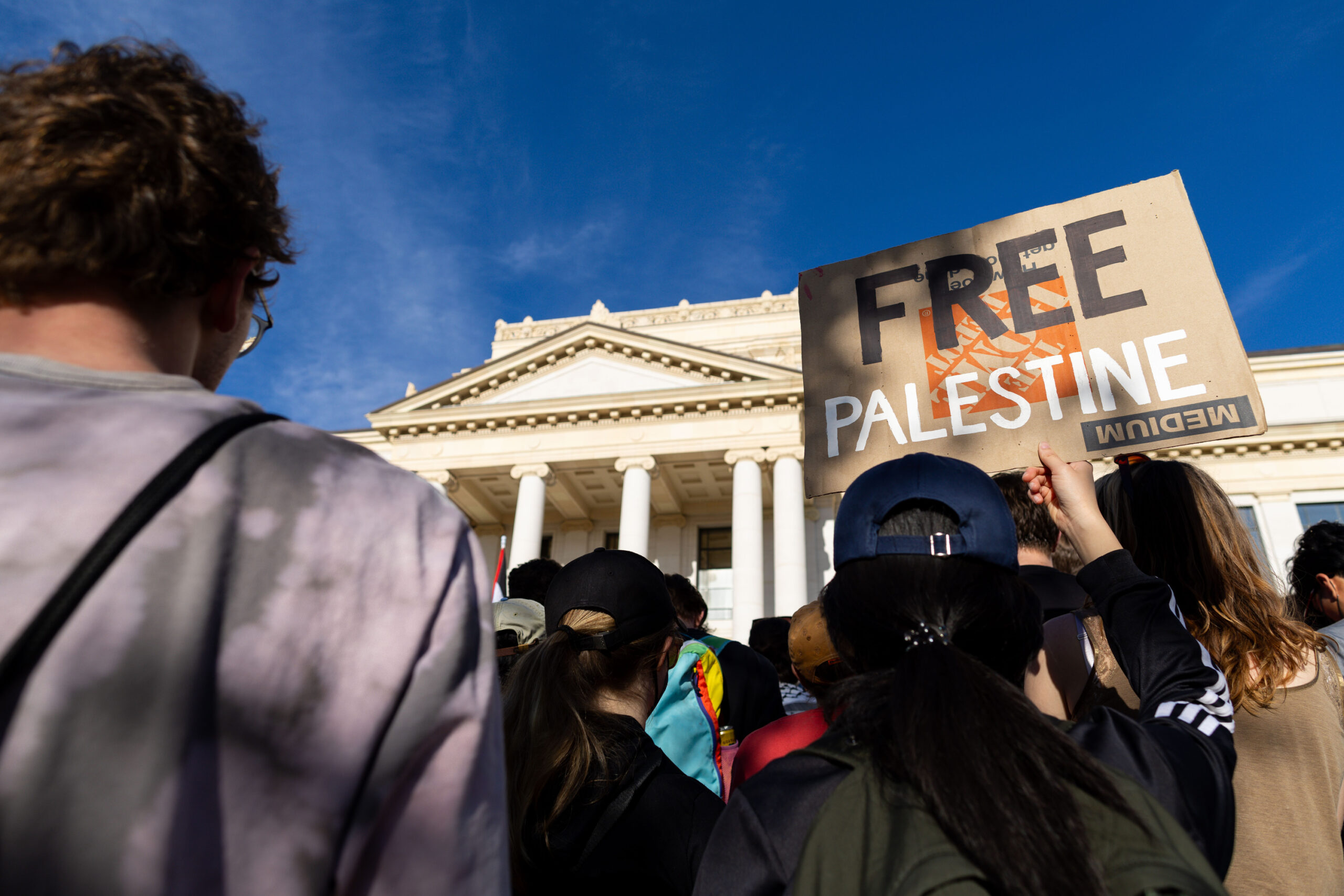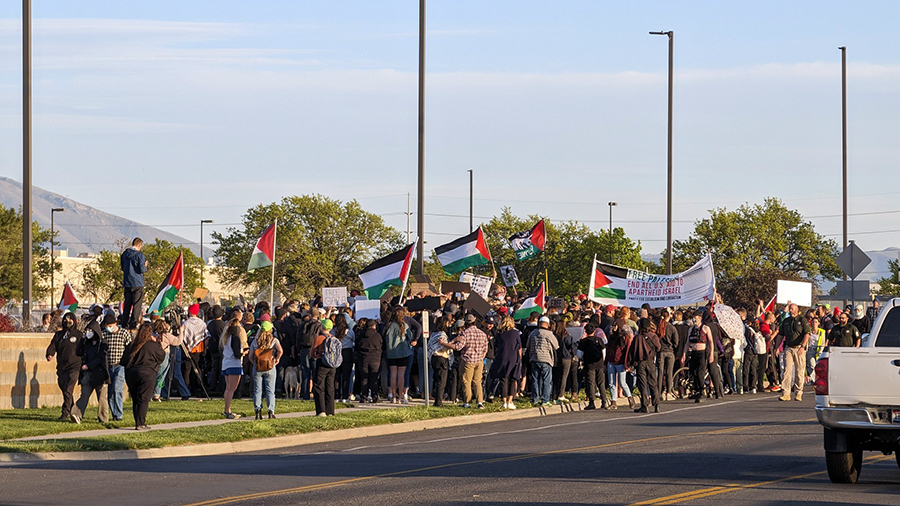Six months after Oct. 7, it still feels like Day 1 for hostage families
Apr 7, 2024, 10:26 PM | Updated: 11:04 pm
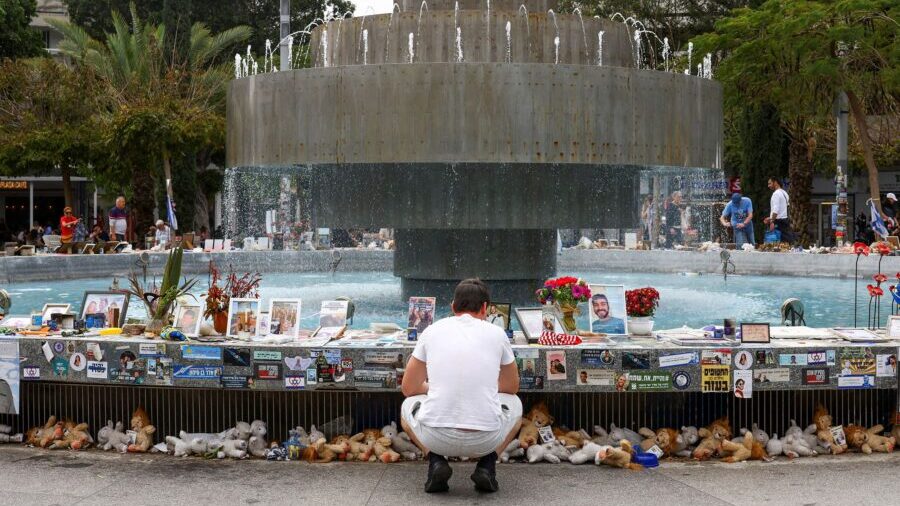
A man looks at memorabilia and pictures of the hostages kidnapped in the October 7 attack, displayed at Dizengoff Square in Tel Aviv, Israel, on March 27. (Hannah McKay, Reuters via CNN Newsource)
(Hannah McKay, Reuters via CNN Newsource)
(CNN) — Life changed in Israel on October 7 last year. The unexpected and overwhelming assault by at least 1,500 Hamas fighters, pouring into Israel by land, sea and even paragliders, killed about 1,200 people, Israeli authorities said. More than 250 people were taken hostage and moved to Hamas’ Gaza stronghold.
Much has happened in the six months since. The massacres at a music festival in the desert and kibbutz communities prompted Israel to declare war on Hamas, leading to air and ground attacks that have devastated Gaza and the lives of the more than two million people for whom it is home.
But for the families of the remaining hostages, and even for some former captives released by Hamas and now safe in Israel, it feels as if nothing has changed. Here we look at those six months from their point of view, in interviews led by CNN’s Bianna Golodryga.
October 7: Hamas launches deadly surprise attacks
The piercing shrieks of air-raid sirens were the first hint of trouble for many Israelis at about 6:30 a.m. on October 7. But for Maya Regev at the all-night Nova music festival, it was the sudden absence of noise that jolted her. The teenager was with her younger brother Itay, one of her best friends Omer Shem-Tov and others, dancing and enjoying themselves.
“We were all together and I just told Omer that it’s the most fun I had, for a lot of time,” she said. “And then it was the moment that the music shut down and they told us that there are rockets. We look up and we see the rockets just fly above our heads.”
Then the shooting began, and Maya, Itay and Omer ran to look for shelter before they connected with a friend and got in their car. That car was fired on by gunmen in a truck, Maya said, and she was hit in both legs. Her brother was wounded too. They were taken from the car and put in a pickup truck, all the while being filmed. That video became public on Saturday night, when Omer’s parents were desperately trying to find him.
“We saw Omer kidnapped,” said his mother, Shelly Shem-Tov. “I saw on the video that Omer is in the floor of a pickup truck with handcuffs on his hands.”
Other parents learned the fate of their children the same way. Ayelet Levy Shachar’s daughter Naama was taken from Kibbutz Nahal Oz, where she was staying. Amid the chaos of the day, Ayelet thought maybe Naama was just unable to reach her. Then she learned through a relative there was a video showing her daughter.
“She’s being dragged out of the trunk of a jeep and then dragged by her hair and shoved into the backseat. It’s a very, very violent video,” she said. “She’s handcuffed with her hands behind her back. And I saw that her face is injured and that she’s barefoot. And there’s a lot of bloodstains. Her pants are stained. You can almost not recognize her because it’s such a mess.”
The hostages were driven through broken barriers to Gaza. Maya said: “When we drove inside, they did, like, a little trip in the roads and screamed Allahu Akbar (God is great.) And they just wanted to show what they caught. I was with my head down, and one of them grabbed my hair and pulled it back so everyone will see my face. And everyone was so happy on the street. And I was so scared.”
October 9: Israel orders a “complete siege” of Gaza
“I think for a week and a half, we just kept quiet and still,” said Ayelet of the immediate aftermath of the attacks. “It’s hard for me to recall what went on in these days. What did we do? What happened? It’s a blur.”
Hadas Kalderon was away from her children when their kibbutz was attacked. She could get no information about son Erez, 11, her daughter Sahar 16, or their father Ofer. They had called to tell her they were hiding in a bush but after that, nothing. Hamas’s propaganda videos of the raids unexpectedly gave her hope that they too were kidnapped not murdered. And when she did see images of Erez being taken on a motorbike, she thought “it was a miracle.” Relocated with the rest of the kibbutz to a hotel, she decided: “We start to work. From the first day we start to work,” she said. What could they do to get their families home.
October 20: Hamas releases two US women on humanitarian grounds
Three days later, two elderly women are also freed from Gaza
In Gaza, the hostages were learning the rules of captivity. Maya’s leg had been shattered by the gunfire. She says she was first taken into the tunnels and then to a hospital. “You have to suffer quietly. It’s something that also came home with me, unfortunately. I’m still learning how to say that I’m in pain to the doctors because I got used to just not saying that I’m in pain and be quiet.”
October 27: Israel Defense Forces say they are “expanding ground operations” in Gaza
In Israel, Hadas was adrift. “From the beginning, I felt all alone. I felt like I’m fighting by myself. Nobody came to tell me what to do.” She finds purpose by giving media interviews to highlight the plight of her children and all the other hostages. It’s the same for Shelly and her husband Malki, who began the Hostages and Missing Families Forum with other relatives of the taken within hours of the events.
In Gaza, Omer Shem-Tov and Itay Regev kept track of time by noting the sunrises and the Muslim call to prayers. Each Friday at sundown, they say the kiddush blessing to usher in the Jewish Sabbath, sometimes with a little grape juice standing in for wine.
October 30: The Israeli military says it has rescued Pvt. Ori Megidish from Gaza
Megidish would later tell Naama Levy’s family she was with their daughter for the first four days. It was the first news they had of her in Gaza.
A day later, on October 31, Omer turned 21. “On his birthday a lot of friends of Omer came over here,” Omer’s father Malki Shem-Tov said. “We couldn’t celebrate it of course, but they came with 200 yellow balloons … We just say, ‘We send the prayer to Omer,’ and we let go all the balloons.”
His parents learn afterwards that this is the first day that Omer cried since he was taken. “He was crying because he thought about us,” his mother Shelly said.
November 15: Israel raids Al-Shifa hospital in search of Hamas militants, after a siege of several days
After her leg was operated on, Maya was held by herself, guarded by a woman and a man. She tried to befriend them. “45 days, it’s a lot of time to be alone. I will just go insane. So I started talking to her,” she said of her ever-present guard. “I asked her about her life. What is she doing? Why is she here? I told her what happened to me. I tried to make her feel sorry for me so she will treat me well. And it worked.” Maya said she was able to get some news from her captors, including of a pending ceasefire.
November 24: Truce begins. 24 hostages – including 10 Thai citizens – are released
The news brought mixed emotions to those desperately waiting for their loved ones to come home. Ayelet said, “I was happy for any hostage being released, but I couldn’t watch others being released and not my daughter.”
November 25: 17 hostages released, including Maya Regev
The temporary ceasefire brought some mixed emotions to Gaza too. Maya said: “It’s the first time that you can really sleep in peace because there is no bombing. But you can’t because you’re so excited. Maybe this is your day. Maybe now you’re going home.”
November 26: Another 17 hostages are freed
November 27: Eleven hostages released, including Erez and Sahar Kalderon
“Sahar was in the tunnels,” her mother Hadas said. “She talked about there is no sun and no good air. You can’t really breathe. And there is not much food … You don’t know if it’s day or night. You can’t really sleep because you’re afraid to fall asleep because somebody with a gun is just near to you. How can you sleep like that?”
Erez, who turned 12 in Gaza, was held alone for much of his captivity. Since getting her children back, Hadas has tried to offer a haven for them, but that’s impossible with their father still in Gaza. “I’m trying to give them a warm house and normal life and to get back to routine. But there is no routine. It’s a lie. There is no routine because there’s no end to this situation. We are all still in the 7th of October.”
November 28: Twelve hostages freed
November 29: A further 16 hostages are released, including Itay Regev and Yarden Roman-Gat
Yarden Roman-Gat’s cause had been relentlessly pushed by her brothers Gili and Liri and her sister Roni, with support from other family members and friends. Yarden, along with her husband Alon and their three-year-old daughter Geffen, had escaped from a kidnapper’s car as it approached Gaza and they ran for safety. Yarden passed her girl to Alon, knowing that he was a stronger runner. She was recaptured, they were not.
November 30: Eight hostages are freed
Some hostages told Ayelet they had seen Naama before they were released. This was the last time she had any news of her daughter.
December 1: The truce collapses
Alon was reunited with his wife Yarden after her release but the end of the deal between Hamas and Israel meant his sister Carmel was left behind. “We were sure that Carmel is going to be released the next day or the day after – maximum. And then the deal collapsed.”
The freed hostages were checked into the hospital and slowly started reconnecting with family and friends. For some, like Maya and Itay, it was important to reach out to the relatives of those who were their fellow captives.
Itay said he and Omer became as close as brothers while they were held together. “We just talked about everything. He told me about his family, he told me about his friends. He told me about his whole life, and I did the same,” Itay said. “He became the person who knows everything about me … and knows more about me than any other person I’ve been around all these years.”
December 4 – Israel moves into Khan Younis and southern Gaza
The remaining hostages began to enter their third month of captivity. Yarden described what it was like to be held. “You have no choice of anything in general. You cannot speak out. You cannot breathe deeply. You cannot be under the sky. There is no certainty,” she said. “It’s very deep aspects of humanity that are taken away.”
December 15 – Israeli soldiers kill three hostages in an operation in northern Gaza
The IDF said the three men, Yotam Haim, Alon Shamriz and Samer Talalka, were wrongly identified as threats.
January 15 – Hamas releases a video, apparently showing two dead hostages
Whether or not the hostage families knew Itai Svirsky or Yossi Sharabi, they grieve all the same.
“When we hear that someone is murdered, we don’t know him, but we know his family, that became our family. And it’s like to lose somebody you know,” Shelly said.
As the length of the war on Hamas, and the hostages’ captivity, ticked to 100 days, some of the former captives have been free longer than they were held. But Maya said her mind was always with those still held. “I think about them all the time and with every single thing I do, in my day – every time I eat cake, I drink coffee, I brush my teeth – I think about them, that they don’t have these things.”
February 7 – Israeli Prime Minister Benjamin Netanyahu derides Hamas demands for another ceasefire as “delusional”
It’s another setback for relatives waiting for loved ones. Alon, who ran to safety with his toddler daughter and had his wife returned, is still missing his sister Carmel.
“This was a traumatic experience, and it still is,” he explained. “I’m still in the event. I’m still waiting for Carmel to come back.” Alon and Carmel’s mother was murdered on October 7. He has not yet been able to grieve for her. “There’s so many other things to do that I don’t have the time in the mind for that. It will come, but not now.”
February 12 – Two Israeli-Argentinian men held by Hamas since October 7 were rescued in an overnight raid by the IDF in Rafah
But the world’s attention has increasingly focused on the utter devastation in Gaza, the number of innocent Palestinians killed and mistakes, or worse, by the IDF resulting in yet more deaths. With aid supplies blocked and aid agencies pulling resources because their staff aren’t safe, no one in Gaza has enough to eat, a UN-backed report says. More than half of the Palestinians there are on the brink of starvation.
Hostage families are having tense exchanges with Netanyahu, demanding more action.
April 3 – Families of Israeli hostages storm the Knesset public gallery
Pressure continues to grow on Netanyahu from inside and outside Israel to stop the civilian deaths and deprivation in Gaza and to bring the hostages home.
There remain 129 hostages in Gaza who were abducted on October 7, and about 95 are thought to be still alive. Each has people desperate to see them again.
“(Omer) is my life,” said his father Malki. “I miss him. I miss him very much … We are in the mission of our life now. This is our mission to bring Omer back home.” He added, “We are doing everything to bring him back home. Everything. Everything. Everything.”
His wife Shelly summed up the last six months: “Our life stopped at October 7th. Stopped. And it’s a long, long, long nightmare.”
It’s a similar sentiment for Ayelet, whose daughter Naama is still missing. “For me, every morning I wake up, thankful that I could get some sleep even, that’s not to be taken lightly. But I wake up and I think and I’m feeling like it’s the same day. Same day for me. Same pain.”


